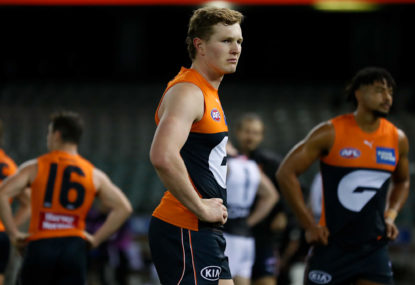It’s entirely possible that GWS was the best team in the finals race this season, yet they’ll tell their story walking after the most ignominious straight sets exit in finals memory.
While Hawthorn were probably the “hottest” team coming into finals, with arguments to be made for the Western Bulldogs and Brisbane too, the Giants had a strong case, and unlike the other three sides, they had secured a top-four position.
Win a Ziggy BBQ for Grand Final day, thanks to Barbeques Galore! Enter Here.
GWS won seven games in a row, between Rounds 17-23, and in that time had beaten fellow finalists Hawthorn, Carlton, Brisbane at the Gabba, and essentially knocked all of Gold Coast, Melbourne and Fremantle out of the finals race when they each had a September berth to play for. Earlier in the season, they’d beaten Port Adelaide, Geelong in Geelong, with another thumping win over the Lions besides.
Wise old football heads always say how dangerous it is to flirt with your form, and did the Giants do exactly that in Round 24 against the Dogs? They made three late changes on the day, and some speculated that in was in their interest to lose that match.
A win would have seen GWS finish third on the ladder, and head to Adelaide for their first final. A loss locked them into fourth position and a hometown match-up with Sydney, which looked like a masterstroke with only a few minutes to go before three-quarter time in that match, when they held a five-goal lead.

Isaac Heeney celebrates a goal. (Photo by Matt King/AFL Photos/via Getty Images)
Did the Giants really have their heart in it for the final term against the Dogs in that last home-and-away match? Only 11 points down at three-quarter time, they were dreadful in the last quarter, kicking only 1.2 to the Dogs’ 5.4, in what was a premonition of their finals performances.
GWS controlled their first final against Sydney for three quarters, winning each one. They were able to respond when Sydney kicked a goal for the most part, and staved off a third quarter challenge to respond like a mature side. It looked like they had absorbed what the Swans could throw at them.
Isaac Heeney, Chad Warner and Tom Papley had other ideas, and those three players in particular won big moment after big moment in the final term, and were simply brilliant at capitalising on the momentum they created.
Experienced players and leaders like Josh Kelly and Toby Greene only touched the ball twice each in that final term, and stoppage specialist Tom Green didn’t lay a tackle on the breakaway Swans. Still, as a team they touched the ball 80 times in the fourth quarter that day, and either played too quickly when it was time for control, or made unforced errors whey they did have time and space.
Saturday night against Brisbane was even worse, coughing up a 44-point lead, and being as far as 31 points up in the last quarter. GWS didn’t kick a goal in the last 32 minutes, and only had two scoring shots in that time. Their inability to control the game was a disgrace.
The most glaring example of a lack of game sense in the last quarter was Brent Daniels taking advantage from a free kick to Jesse Hogan at the top of the goal square, and soccering through a behind from a few metres out.
Forgetting the fact that Daniels kicked it with his opposite foot, which was a far riskier proposition than a set shot for Hogan, it was incredibly poor time management. This was a chance to eat up 30 seconds of clock gone begging. Daniels is 25 years old and playing his ninth final, so inexperience was not a factor.
Twice in the last term, Tom Green fired off a no-look handball over his shoulder. It was such dumb, dumb play for a player with a supposedly high footy IQ. Such low percentage plays when you have a lead in a cut-throat final were stunning. Both times, the Lions took the ball away, and inside 50, kicking a goal from one of them. Both times, he could have just been tackled and a ball-up would have followed.
Kieren Briggs had 20 hit outs in the last quarter alone. Too many of them were putting the ball into space, exactly what Brisbane wanted, allowing the likes of Will Ashcroft, Dayne Zorko and co to clear the ball away.
The easiest way to kick goals is when the game is open and free-flowing. The hardest way is when it’s a defensive grind with big numbers locking the ball into stoppage. It boggled the mind how often the Giants did the opposite of what they should have been, and is a huge black mark against Adam Kingsley.
It’s pretty basic in how to manage a game of AFL football when possessing a lead in the last quarter. When in front, keep the ball in tight. Look for repeat stoppages. Ruckmen tap to their feet. Congestion is your friend. Allow yourself to get tackled quickly. Don’t put the ball into the open by tapping it on. Long down the line if there are no free options. Use all the time the umpire gives you. Kick close the boundary. Play a stop and start game.
When coming from the behind it’s the opposite; you want the ball open and in constant motion, stoppages are the enemy, ruckman thump it into space, play on at all costs, take risks, go inboard, man up to prevent cheap possessions.
GWS failed abysmally to hold their leads, and allowed both Sydney and Brisbane to play the game the exact way they needed to in order to overcome them. The Giants have blown their best chance yet for a premiership, and who knows when they’ll get another one.




































































































